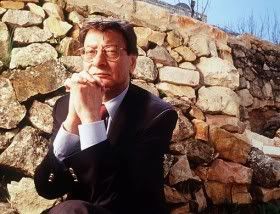
Mahmoud Darwish, Palestinian poet, is dead was the headline of this Rueters/AP story.
August 10, 2008
RAMALLAH, West Bank: Mahmoud Darwish, whose prose gave voice to the Palestinian experience of exile, occupation and infighting, died Saturday in Houston. He was 67.
The preeminent Palestinian poet, whose work has been translated into more than 20 languages and has won numerous international awards, died from complications after open heart surgery at a Houston hospital, said Nabil Abu Rdeneh, a spokesman for the Palestinian presidency.
Born to a large Muslim family in what is now Israel, he emerged as a Palestinian cultural icon eloquently describing his people’s struggle for independence, while criticizing both the Israeli occupation and the Palestinian leadership. He gave voice to the Palestinian dreams of statehood, crafted their declaration of independence, and helped forge a Palestinian national identity.
“He felt the pulse of Palestinians in beautiful poetry,” said Ali Qleibo, a Palestinian anthropologist and lecturer in cultural studies at Al Quds University in Jerusalem. “He was a mirror of the Palestinian society.”
According to an article from the Voice of America, Palestinians are observing three days of mourning for Mahmoud Darwish, who is described as their “National Poet.” Like the great Palestinian painter, Ismail Shammout, Darwish was only a boy when Israel became a state in 1948. His family fled when their village near what is today the Israeli port city of Haifa was destroyed. Like Shammout’s experience, his family was part of the ethnic cleansing that emptied Palestine of two thirds of its original Arab inhabitants. Darwish lived in exile in Cairo, Beirut, Tunis and Paris until returning to the West Bank in 1996.
Darwish eloquently expressed the dream of Palestinian statehood and helped forge a Palestinian national identity.
(In his poetry),” Darwish speaks of a land called Palestine, a name that was and is and will endure.
His poetry deals with the themes of displacement and exile.
Mahmoud Darwish’s internet site provides considerable information about his poetry.
In a recent poem called The Written Script, Darwish relates a dialogue between a victim and his enemy who fall into a pit together and are waiting for someone to throw them a lifeline. It is a metaphor for the Israeli-Palestinian conflict. In the poem, he sees Israelis bent on suicide, taking Palestinians with them, if the occupation and colonization of the West Bank continue. “A killer and his victim die together in one hole,” he says in the piece.
Darwish reportedly spoke fluent Hebrew and had many Israeli and Jewish friends. “I have multiple images of the Israeli other,” he said. Some of Darwish’s most memorable poems offered tender, nuanced portraits of the “Israeli other” – his Jewish friends and lovers.
A Soldier Dreaming of White Lilies was written just after the 1967 war. In it, Darwish tells of an Israeli friend who decided to leave the country after returning home from the front.
I want a good heart
Not the weight of a gun’s magazine.
I refuse to die
Turning my gun my love
On women and children.
I am reminded here of a story told by an Israeli soldier, a Refusnik, about a friend who suicided after shooting a pregnant Palestinian woman in the stomach. She died then he died.
On learning of Darwish’s death, Gush Shalom, the Israeli peace organization, sent out a memo, part of which read:
“At his gravesite we salute Mahmoud Darwish, son of Galilee, conscience of the Palestinian people, poet of anger and hope, partner in the struggle for peace between the two peoples of this land” says the Gush Shalom movement. Many of us knew and cherished Mahmoud Darwish, the man and the poet. His untimely death is a great loss and a difficult one for the Palestinian people, and also for peace seeking Israelis.
In a telegram to Education Minister Yuli Tamir Gush Shalom calls for honoring the memory of Mahmoud Darwish by including some of his poems in the curriculum of the Israeli schools….
(snip)
– to learn through it a bit about the suffering and aspirations of those with whom we can and should make peace.”
Rest in peace, Mahmoud Darwish.

Thanks for the diary, shergald!